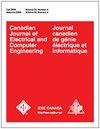Toward a Way to Benchmark Multilevel Inverter Topologies Based on Level to Components Ratio
IF 1.7
Q2 Engineering
Canadian Journal of Electrical and Computer Engineering-Revue Canadienne De Genie Electrique et Informatique
Pub Date : 2019-06-24
DOI:10.1109/CJECE.2019.2892087
引用次数: 2
Abstract
This paper introduces a generalized platform for the design selection of multilevel inverters (MLIs) topologies for any industry, especially in low- and medium-power applications. This platform is novel as it combines the component count and stress in any MLI in a normalized unique score. Each MLI topology is designed to match specific criteria to meet a specific application, which introduces diversified sets of merits and demerits in each case. Therefore, choosing a suitable MLI topology for the specific application is rather a difficult, time-consuming, and complex process. Moreover, the comparison can only be conducted between MLI topologies that fall under the same category. This paper introduces a comprehensive study to propose a new benchmark (BM) which can be used to compare MLI topologies regardless of their constructions or oriented applications. Each MLI topology gets a BM score based on comparative factors that evaluate its components quantitatively and qualitatively. Thus, comparing different types of MLI topologies is a simple process of comparing their calculated BM scores leading to better well-informed choice. First, the proposed BM-derived forms are discussed. Then, the proposed methodology is illustrated by applying to various types of MLI topologies including conventional and recently introduced ones.基于电平与元件比的多电平逆变器拓扑基准测试方法研究
本文介绍了一个适用于任何行业,特别是中、低功率应用的多电平逆变器(mli)拓扑设计选择的通用平台。该平台是新颖的,因为它将任何MLI中的组件计数和应力结合在一个标准化的唯一分数中。每个MLI拓扑都设计为满足特定应用的特定标准,这在每种情况下引入了不同的优点和缺点集。因此,为特定的应用程序选择合适的MLI拓扑是一个相当困难、耗时和复杂的过程。而且,只能在属于同一类别的MLI拓扑之间进行比较。本文介绍了一项全面的研究,提出了一个新的基准(BM),可以用来比较不同结构或面向应用的MLI拓扑。每个MLI拓扑根据定量和定性地评估其组成部分的比较因素获得一个BM分数。因此,比较不同类型的MLI拓扑是一个简单的过程,比较它们计算的BM分数,从而更好地做出明智的选择。首先,讨论了所提出的bm派生形式。然后,通过应用各种类型的MLI拓扑(包括传统拓扑和最近引入的拓扑)来说明所提出的方法。
本文章由计算机程序翻译,如有差异,请以英文原文为准。
求助全文
约1分钟内获得全文
求助全文
来源期刊

自引率
0.00%
发文量
27
期刊介绍:
The Canadian Journal of Electrical and Computer Engineering (ISSN-0840-8688), issued quarterly, has been publishing high-quality refereed scientific papers in all areas of electrical and computer engineering since 1976
 求助内容:
求助内容: 应助结果提醒方式:
应助结果提醒方式:


